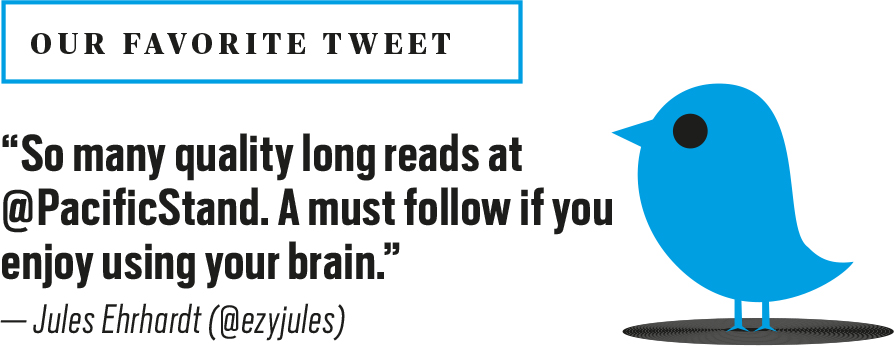THE OMNISCIENT CLASSROOM
As Kevin Carey shows in his article (May/June), project learning works and works well, but in forgetting about AltSchool’s roots, Carey ignored the Dewey/Montessori models of peer-supported instruction.
—Joe Beckmann, Somerville, Massachusetts
REFORM OF THE NERDS
Arthur Chu (May/June) shows some of the advantages of being an outsider: the willingness to risk popularity to say what must be said, to truly be yourself. The irony about not becoming part of the herd is that you often attract people who see you as some form of new leader, thus creating a new herd, whether you want to or not.
—Christopher Blackwell, via email
THE DANGERS OF SPIRITUAL AMATEURISM IN AMERICA
I was an involved and dedicated member of the Diamond Mountain community for nearly seven years and worked closely with all the people mentioned in Spencer Orey’s story (March/April). It was definitely not the “decontextualization” of Tantra that made the community dangerous in this case, but, rather, that Tantra and Tantric communities have always been corrupt and have taught useless dogmatic hogwash that has effectively functioned to serve the Buddhist cult hierarchy.
—Nicole Sanderson, via email
DISPATCHES FROM THE RUSSIAN RIVER
Alexis Coe has received several responses from readers about her Web series, including some of her neighbors:
Somehow being referred to as a “creek person” by author Alexis Coe is just a hair shy of being insulting. The “backwoods” community she refers to is just a few miles off a widely traveled main road that cuts through several towns and innumerable wineries. I have a master’s degree and work in a professional capacity in Marin County. My husband is a project foreman for a multimillion-dollar job in San Francisco. Other neighbors include business managers, accountants, teachers, and entrepreneurs.
—Barbara Reagan, Cazadero, California
AUNT MOMMY
I read Rachel Rabkin Peachman’s article (March/April) with great interest, as I have a nephew who is adopted. But I was taken aback by Jean Benward’s quote in the article about the “myth” of children turning on their mothers at some point and saying, “You’re not my mother.” Benward categorically states, “This doesn’t happen.” I can tell you from my sister-in-law’s experience: It most certainly does. My nephew, who is seven, came home from school a few days ago and told my sister-in-law that she was his “fake mom.” I can certainly understand why parents involved in any “non-traditional birth” would be hesitant to divulge this birthing history to their children. It’s complicated and scary for both the children and the adults. Someone who is supposed to be an expert in the field should be more careful before making sweeping statements.
—Name withheld, via email
NEW MAMMOGRAM GUIDELINES
I am writing about Linda Goler Blount’s story, “New Mammogram Guidelines Undermine Breast Health for Black Women,” on your website. I feel Blount is doing a disservice to women by misrepresenting the recommendations of the United States Preventive Services Task Force regarding mammograms for women under 50. It is true that the USPSTF does not recommend mammograms for these women [every year] because of the incidents of false positives. But Ms. Blount describes the outcome of such a result as simply anxiety, until the misdiagnosed woman receives a retest and is reassured. This is wrong. The USPSTF is concerned because of the following: “Harms of breast cancer screening may include overdiagnosis and overtreatment (that is, being diagnosed with and treated for a slow or non-growing cancer that would not otherwise have become apparent or life-threatening during a woman’s lifetime).” Some women receive treatment for breast cancer when they either do not have breast cancer, or have a cancer that would not have truly harmed them. Some of these women may even die from that treatment. This is why the USPSTF wants to leave the decision up to individual women—because a mammogram offers a very real risk of actual harm to women under 50, not because we might feel anxiety.
—Adria Kyne, via email
CORRECTION
In our May/June 2015 issue, we stated that Talila Lewis, one of our “Thirty Thinkers Under 30,” is currently a law clerk at the ACLU. She was a law clerk at the ACLU until her graduation from American University, in 2014.


For more from Pacific Standard, and to support our work, sign up for our email newsletter and subscribe to our print magazine, where this piece also appeared. Digital editions are available in the App Store and on Zinio and other platforms.





